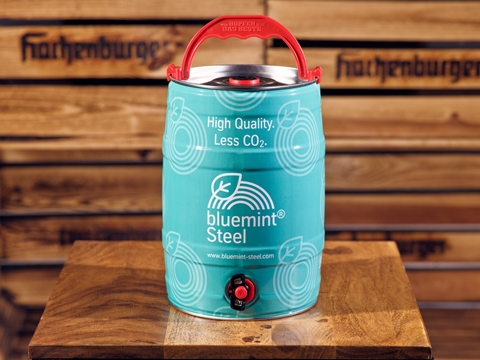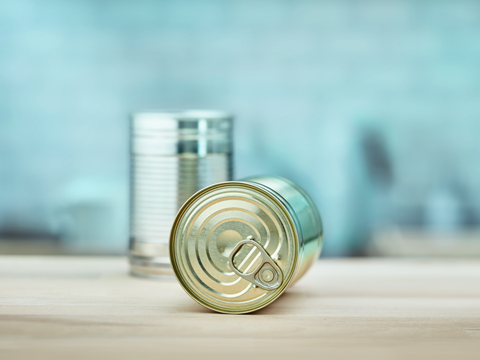
As part of our Sustainability Awards Finalist Interview series, thyssenkrupp spoke to us about its CO2-reduced tinplate, aiming to reduce emissions in the packaging steel process and nominated in the Commercialized Climate category.
You’re a finalist in the Sustainability Awards 2024. Congratulations! To start off, could you summarise your entry, in less than 50 words?
The current steel production causes large amounts of CO2. The focus of the new development was on reducing CO2 emissions in the process chain of packaging steel. Tinplate made of bluemint Steel is a ground-breaking development, a manufacturing process that reduces CO2 emissions by up to 69% compared to conventional tinplate.
Why do you think the judges were impressed with your entry? Tell us about what is innovative about your project and/or about its impact on packaging sustainability.
A CO2 reduction of up to 69% compared to conventional tinplate is truly impressive. bluemint Steel uses alternative source materials in the steel production process, reducing the coal consumption required for the reduction process in the blast furnace. Renewable energies are also used in the downstream process chain.
It is evident that an increasing number of manufacturers are already interested in CO2-reduced packaging steel to make their products more environmentally friendly and appealing to their customers. With bluemint Steel, thyssenkrupp Rasselstein is offering an ultra-premium product that meets these standards without sacrificing quality.
Qualifications are not necessary; customers can switch to bluemint Steel without additional effort and thus realize real CO2 savings without the need for compensation certificates. The CO2 savings in the production of bluemint Steel help packaging manufacturers and their customers reduce their CO₂ footprint and achieve their Scope 3 target.
For centuries, coking coal has been used in blast furnaces to produce pig iron – a process that has produced significant quantities of carbon dioxide to date. Now, thyssenkrupp is gradually transitioning to a more environmentally sustainable process.
bluemint Steel is the first step. The core of the transformation is the switch from blast furnaces and coal to Direct Reduction (DR) plants and green hydrogen. The first hydrogen-based direct reduction plant will go into operation at the Duisburg site in 2027. The aim is to completely decarbonize the primary steel route by 2045 at the latest. The whole thing is nothing less than an industrial revolution.

Finally, can you tell us about the ongoing development of your project, e.g. how your innovation/initiative has been received by the industry, or what the next steps are in commercialization/product development?
More and more companies are already using tinplate made of bluemint Steel. And thyssenkrupp Rasselstein presents the innovation regularly to many interested Fast Moving Consumer Goods (FMCG) producers. For example, German brewery Westerwald-Brauerei is serving its Hachenburger beer in 5-litre party kegs made of tinplate from bluemint Steel, provided by Julius Kleemann.
Sika Deutschland, developer and producer of systems and products for applications including bonding, sealing, and protecting in the building and automotive sectors, is using hobbocks manufactured from thyssenkrupp Rasselstein’s CO2 reduced tinplate for adhesives and sealants. The tinplate hobbocks are manufactured by Muhr & Söhne, a specialist in steel and tinplate hazardous products packaging.
WestWood uses tinplate packaging from Muhr & Söhne made from CO2 reduced bluemint Steel for the safe storage and transportation of its Polymethyl Methacrylate (PMMA) system solutions. PMMA sealing and coating systems are highly reactive, so sealed tinplate containers offer the greatest protection and highest possible safety for the packaging and transportation of this filling material.
Fruit jam and confectionery producer Zentis is using tinplate made of bluemint Steel for the closures of its NaturRein fruit spreads, and packaging manufacturer Hoffmann Neopac collaborated with herbal candy company Ricola to introduce the first food can with reduced CO2 intensity.
The winners of the Sustainability Awards 2024 will be announced at the Sustainable Packaging Summit, taking place in Amsterdam on 12-13 November. The Summit mobilizes leaders of the FMCG value chain, policymakers, NGOs, recyclers and investors to collaborate, remove barriers and identify opportunities on the road to sustainable transformation.
To learn more or register, visit: https://www.packagingsummit.earth/2024
If you liked this story, you might also enjoy:
How are the top brands progressing on packaging sustainability?
Sustainable Innovation Report 2024: Current trends and future priorities
Reuse vs. single use – which is better for the environment?
The ultimate guide to global plastic sustainability regulation














No comments yet